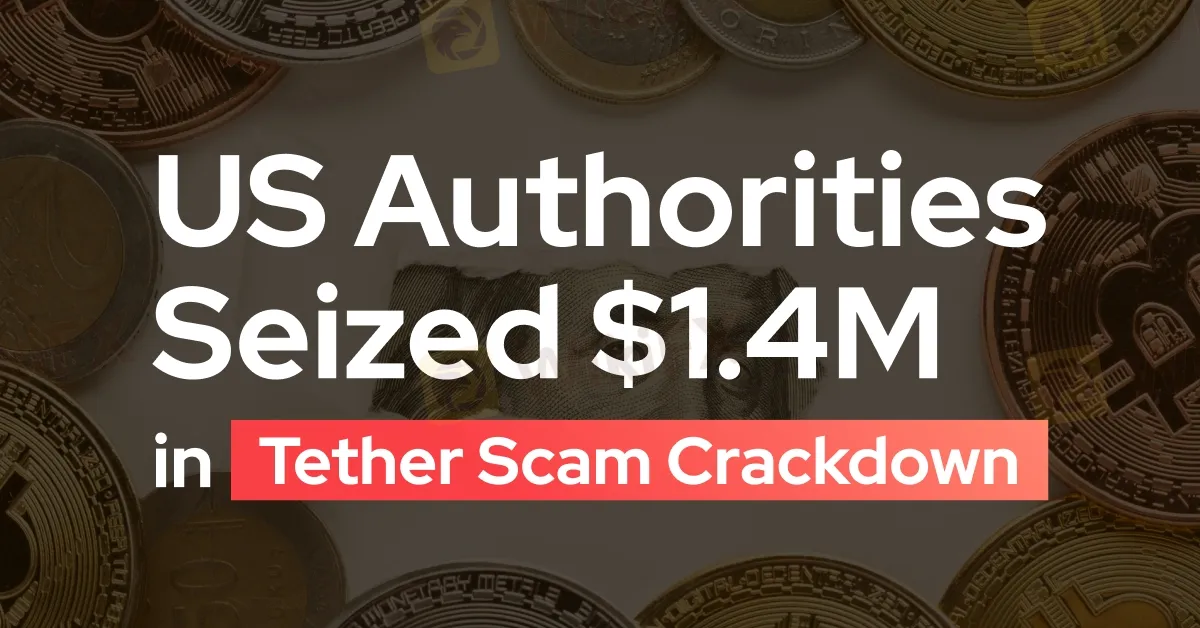简体中文
繁體中文
English
Pусский
日本語
ภาษาไทย
Tiếng Việt
Bahasa Indonesia
Español
हिन्दी
Filippiiniläinen
Français
Deutsch
Português
Türkçe
한국어
العربية
US Authorities Seized $1.4M in Tether Scam Crackdown
Abstract:In a decisive move against digital deception, U.S. authorities have seized $1.4 million in Tether (USDT) as part of a crackdown on a fraudulent customer support operation.

In a significant development, the U.S. Attorneys Office in Chicago, Illinois, has seized approximately $1.4 million in Tether (USDT) as part of a determined effort to dismantle a customer support scam operation. Executed on March 12, this move targeted funds suspected to have been fraudulently obtained, primarily affecting vulnerable elderly individuals.
The operation, spearheaded by the Department of Justice (DOJ) and the Federal Bureau of Investigation (FBI), received cooperation from Tether, a digital currency platform. The scam itself involved deceiving victims through deceptive popup advertisements, falsely asserting that their computers had been compromised.

Upon contacting the provided fake customer support number, victims were further misled into believing their bank accounts were in jeopardy. Subsequently, scammers, posing as support agents, persuaded victims to transfer their bank funds into USDT under the guise of safeguarding their assets, effectively seizing control of the victims tokens.
This case marks one of the initial instances in the United States of successfully retrieving USDT from an unhosted digital currency wallet. While the exact method of recovery remains undisclosed, an affidavit filed on January 24 suggests law enforcement was able to trace the stolen funds to five distinct wallets. These wallets were involved in a wire fraud scheme, with assets moved in small increments through intermediary addresses, likely as an attempt to launder the proceeds.
Despite Tether‘s operations being conducted outside U.S. jurisdiction, American regulators, particularly through the Office of Foreign Assets Control (OFAC), possess mechanisms to influence the stablecoin’s international operations.
A significant regulatory intervention involves Tethers association with Tornado Cash, a cryptocurrency mixer on the Ethereum network, which was sanctioned by OFAC in August 2022 for engaging in money laundering activities. This regulatory action highlights the ability of governmental bodies to indirectly impact tether usage through international cooperation and measures targeting affiliated entities.
Earlier in February, JPMorgan Chase suggested that impending stablecoin regulations could pose challenges for Tether. They argued that such regulations are likely to favour stablecoins offering greater transparency and adherence to emerging Know Your Customer (KYC) and Anti-Money Laundering (AML) standards, potentially affecting Tethers appeal. This regulatory shift could also impact the decentralized finance (DeFi) sector, where USDT plays a crucial role as collateral and liquidity.

Disclaimer:
The views in this article only represent the author's personal views, and do not constitute investment advice on this platform. This platform does not guarantee the accuracy, completeness and timeliness of the information in the article, and will not be liable for any loss caused by the use of or reliance on the information in the article.
Read more

Bitfinex Hacker Ilya Lichtenstein Sentenced to 5 Years in Prison
Bitfinex hacker Ilya Lichtenstein was sentenced to 5 years for stealing 120K Bitcoins as the cryptocurrency soars past $93K amid bullish market trends.

Italy’s CONSOB Blocks Seven Unregistered Financial Websites
Italy’s CONSOB ordered seven unauthorized investment websites blocked, urging investors to exercise caution to avoid fraud. Learn more about their latest actions.

UK Sets Stage for Stablecoin Regulation and Staking Exemption
The United Kingdom is advancing its approach to cryptocurrency regulation with a specific focus on stablecoins and the potential exemption of staking services. British authorities are preparing new legislative measures to be implemented by December, aiming to bolster the nation’s appeal as a hub for digital asset innovation.

CySEC Warns Against Unauthorized Investment Firms in Cyprus
CySEC warns investors about unregulated investment firms in Cyprus. Verify broker reliability through the WikiFX app to stay protected from scams.
WikiFX Broker
Latest News
CWG Markets Got FSCA, South Africa Authorisation
Amazon launches Temu and Shein rival with \crazy low\ prices
CySEC Warns Against Unauthorized Investment Firms in Cyprus
JUST Finance and UBX Launch Multi-Currency Stablecoin Exchange
XM Revamps Website with Sleek Design and App Focus
TradingView & Mexico’s Uni. Partnership, to Enhance Financial Education
Something You Need to Know About SogoTrade
Global Shift in Cryptocurrency Taxation: Italy and Denmark Chart New Paths
Webull Introduces 24/5 Overnight Trading to Extend U.S. Market Access
eToro Launches Global-Edge Smart Portfolio: A Balanced Approach to Growth and Stability
Currency Calculator


